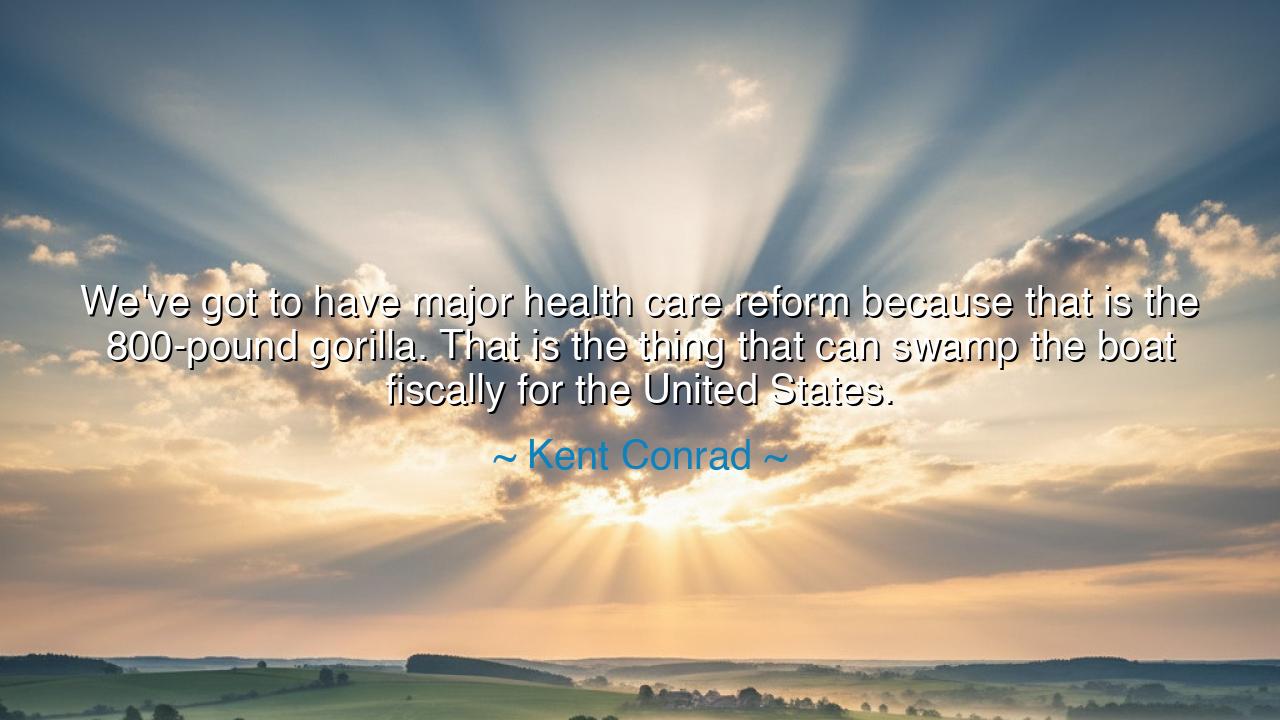
We've got to have major health care reform because that is the
We've got to have major health care reform because that is the 800-pound gorilla. That is the thing that can swamp the boat fiscally for the United States.






“We’ve got to have major health care reform because that is the 800-pound gorilla. That is the thing that can swamp the boat fiscally for the United States.” Thus spoke Kent Conrad, a man who gazed upon the vast machinery of a nation’s economy and saw within it a single, looming force—a force so powerful that, if left untamed, it could drag the entire vessel of America beneath the waves. His words, though rooted in the language of policy, echo with the gravity of prophecy. For what he calls the “800-pound gorilla” is none other than the growing burden of health care costs, an invisible giant that feeds upon neglect, inefficiency, and delay. And in his warning we hear the timeless wisdom of the ancients: that the greatest threats are often not the storms without, but the unchecked forces within.
In Conrad’s words, there is both urgency and foresight. To him, health care reform was not merely a matter of compassion, but of survival—an act of stewardship necessary to preserve the stability of the republic itself. For when a society spends beyond its means to sustain a system that grows ever more costly and less efficient, it plants the seeds of its own undoing. The “boat” he speaks of is the nation’s economy, the vessel that carries the hopes and labors of millions. And the fiscal storm he warns of is not of sudden making—it is the slow, rising tide of medical expenses, of debts accumulating like unseen waves, threatening to drown future generations in their wake.
The ancients, too, understood the peril of imbalance. In the time of Ancient Rome, as the empire grew rich and vast, the burden of its institutions grew heavier. Lavish spending on armies and monuments, once symbols of strength, became anchors dragging the empire down. The leaders who failed to reform their systems when warning signs appeared were soon swept away by history’s tide. So too does Conrad’s warning reflect this same eternal law: that no nation, however powerful, can endure if it does not master its own foundations. Health care, meant to heal the body of the people, must not become the disease that weakens the state.
To understand his meaning more deeply, one must look beyond numbers and see the moral heart of the issue. When the cost of health grows unchecked, it is not only the economy that suffers—it is the people. Families go bankrupt, elders forgo treatment, and the poor are left to bear the heaviest burdens. In this sense, Conrad’s “800-pound gorilla” is not just fiscal—it is moral. It represents the growing distance between what a society claims to value and what it actually sustains. To let such a system persist is to choose decay over duty, short-term comfort over long-term strength. True reform, then, is not only an act of economics—it is an act of justice.
History offers us a parable in the figure of Otto von Bismarck, the Iron Chancellor of Germany, who in the 19th century saw the same truth that Conrad would later speak. Realizing that a strong nation could not stand upon the suffering of its workers, he established one of the world’s first systems of universal health insurance. His vision was not born of charity alone but of wisdom: he knew that a state which invests in the well-being of its people invests in its own endurance. Thus, Bismarck’s reforms became the cornerstone of modern governance—a reminder that the health of the people and the health of the nation are one and the same.
Kent Conrad’s warning is therefore a summons—to courage, to discipline, and to foresight. He calls upon leaders and citizens alike to face the difficult truth: that reform cannot be delayed without consequence, and that comfort today may become crisis tomorrow. The “800-pound gorilla” will not shrink through denial; it must be met with wisdom, restraint, and compassion. It is not enough to hope for healing—we must build it, through systems that are fair, efficient, and humane. For the true strength of a nation lies not in its wealth, but in its ability to care for its own without sinking under the weight of its own design.
So, my child, heed this lesson and carry it into your own time: when a great problem looms like a beast before you, do not avert your eyes. Whether it be in the life of a nation or the life of one person, neglect is the father of ruin. Face the truth, name the challenge, and reform what must be reformed. For if the “boat” of your life—or your society—is to endure the storms of time, its structure must be sound, its balance true.
Let Kent Conrad’s words stand not only as a warning of peril but as a beacon of responsibility. The 800-pound gorilla may yet be tamed, if those who steer the vessel act with wisdom and resolve. For as every sailor knows, it is not the size of the storm that decides the fate of the ship, but the courage and unity of those who hold the helm. And so it is with nations, and with all who seek to navigate the uncertain seas of life: reform is the art of steering—of guiding the vessel from danger toward the safe and shining shore of sustainability and strength.






AAdministratorAdministrator
Welcome, honored guests. Please leave a comment, we will respond soon